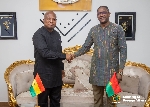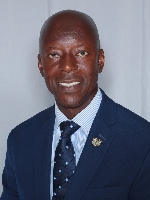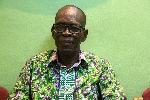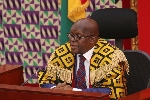Ghana must own identity backbone for Africa's digital economy — Moses Kwesi Baiden Jnr.
 Moses Kwesi Baiden Jnr
Moses Kwesi Baiden Jnr
In a powerful keynote address themed “Building the Identity Backbone of Africa’s Digital Economy”, the Executive Chairman of Margins ID Group, Mr. Moses Kwesi Baiden Jnr., highlighted Ghana’s emergence as a continental leader in trusted digital identity systems.
Speaking in the presence of His Excellency the President of the Republic of Ghana, senior government officials, the Executive Secretary of the National Identification Authority (NIA), and members of the diplomatic corps, Mr. Baiden declared that “identity has become the operating system of modern governance.”
He noted that Ghana recognised the strategic importance of identity early and acted proactively.
“We did not wait for identity to become a crisis before we treated it as national infrastructure,” he said, adding that the Ghanacard is now “the trust layer for the digital economy we are building.”
Ghana’s biometric identity architecture, developed and operated locally, has enrolled over nineteen million citizens into one interoperable ecosystem.
According to Mr. Baiden, this achievement is not merely about numbers, but about building a “single national source of truth” that connects key sectors — from healthcare and taxation to education, transport, border management, and financial services.
“This means Ghana is now operating with verifiable citizens, not assumptions,” he emphasised.
“It means every institution can anchor decisions in certainty.”
Mr. Baiden underscored Ghana’s sovereignty in managing its identity infrastructure, contrasting it with other African nations that have lost control of national registers due to outsourced systems.
“Our architecture is sovereign; the infrastructure is built, operated and secured locally.
That was not luck; it was design.”
The Margins ID Group head outlined how biometric verification is already delivering measurable results across sectors:
Healthcare: Reduction in fraudulent and duplicate claims, saving public funds.
Revenue Administration: Increase in registered taxpayers without raising taxes, by making anonymity impossible.
Financial Services: Audit trails that deter impersonation and enhance regulatory oversight.
Transport: Elimination of duplicate driver identities and fraudulent renewals.
Border Security: Biometric verification ensuring identity integrity and faster throughput.
He also turned attention to education, describing widespread examination malpractices as a national threat to competitiveness.
Citing the 2024–2025 WAEC reports, he called for biometric verification of candidates to safeguard merit and restore confidence in academic integrity.
Mr. Baiden warned that with the rise of Artificial Intelligence and deepfake technologies, identity has become the critical firewall against digital impersonation and synthetic identities.
“The threat has moved from forgery to simulation,” he said. “Without a biometric source of truth even advanced governments are struggling to handle this rise.”
He emphasised that Ghana is not in the experimental phase but fully operational: “Where others are piloting, we are integrating.
This positions our country not only as a national success but as a continental reference point.”
While praising Ghana’s technological readiness, Mr. Baiden urged stronger institutional enforcement and policy alignment to maximise the system’s potential.
“The next phase is not technical; it is alignment and enforcement,” he said.
He called on all Ministries, regulators, and agencies to make verification the standard at the point of service — replacing photocopies with real-time biometric checks.
“When verification becomes the default, fraud moves from loophole to dead end.”
Mr. Baiden concluded by emphasising that Africa’s digital future depends on sovereign, locally controlled identity systems.
“Africa cannot build a digital economy on external infrastructure.
It must build on what it controls and can sustain.”
He envisioned a future where Ghana’s trusted identity ecosystem enables innovation, transparency, and equitable access to services.
“When identity becomes the gatekeeper of access, the country becomes fairer, more efficient, and more secure.
That is the Ghana we are building.”
In summary, Ghana has not only built the digital infrastructure for a modern state but is now positioned to lead Africa in identity-enabled governance — anchoring trust, protecting value, and empowering citizens in the digital era.
“The system is ready,” Mr. Baiden declared. “Policy commitment must now match the infrastructure.
Identity is how we secure value; it is how we protect public resources; and it is how Ghana strengthens its place in the future global economy”
Source: Classfmonline.com/Cecil Mensah
Trending News

Nana Oye Bampoe-Addo at 60: A legacy of gender advocacy and inclusive leadership
15:43
Foreign Affairs Minister begins 2-day visit to Burkina Faso to deepen security, diplomatic ties
18:17
Security Bill flawed; centralises excessive power at the Presidency – Minority
08:23
Peter Yaw Kwakye-Ackah urges Ghanaians to prioritise local food production
14:32
B/R: Bono Police recover 5 firearms in shootout, 1 suspect killed
21:08
VADUG Chairman urges Trade Minister to improve engagement with vehicular industry
12:02
GFL Secretary General urges trade union leaders to align with NDC's socialist ideology
14:59
Police arrest 14, including National Security operatives, over demolition of buildings in Gomoa Akoti and Ojobi
13:46
Alban Bagbin: Political parties must lead gender empowerment push
18:05
Ghana’s High Commissioner to South Africa pays courtesy call on Asantehene in Sandton
08:19




